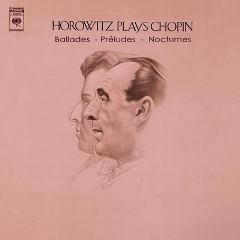Horowitz plays Chopin - Ballades, Preludes, Etudes (2003)
Horowitz plays Chopin - Ballades, Preludes, Etudes (2003)

1. Ballade No. 1 in G minor, Op. 23 Recorded on 2-3.I.1968 2. Prélude in B minor, Op. 28, No. 6 Recorded on 6.VII.1972 3. Prélude in D-flat Major, Op. 28, No. 15 "Raindrop" Recorded on 14.IV & 4.V.1971 4. Étude in E Major, Op. 10, No. 3 Recorded on 6.VII.1972 5. Étude in C-sharp minor, Op. 10, No. 4 Recorded on 8 & 15.II.1973 6. Étude in G-flat Major, Op. 10, No. 5 "Black Key" play Recorded on 14.IV.1971 7. Étude in E-flat minor, Op. 10, No. 6 Recorded on 4.XI.1963 8. Étude in F Major, Op. 10, No. 8 Recorded on 9.V.1964 9. Etude in C minor, Op. 10. No. 12 Recorded on 4.XI.1963 10. Étude in C minor, Op. 10, No. 12 "Revolutionary" Recorded on 6.VII.1972 11. Étude in A-flat Major, Op. 25, No. 1 "Aeolian Harp" Recorded on 20.X - 1.XI.1989 12. Étude in E minor, Op. 25, No. 5 Recorded on 20.X - 1.XI.1989 13. Etude in C-sharp minor, Op. 25, No. 7 Recorded on 14.XI.1963 14. Étude No. 2 in A-flat Major from "Trois Nouvelles Études" play Recorded on 7.IV.1965 15. Introduction and Rondo in E-flat Major, Op. 16 Recorded on 14.IV.1971 16. Ballade No. 1 in G minor, Op. 23 Recorded on 9.V.1965 Vladimir Horowitz, piano
Vladimir Horowitz (who had a Polish grandmother and was fond of pointing out that he was "half as much a Pole as Chopin"), recorded more of Chopin's music than that of any other composer.
Horowitz made four (approved) recordings of the Chopin's Ballade in G-Minor. Truth be told, he was never entirely successful in the work, finding difficulty in balancing the episodic and structural elements. The versions here, from the 1965 return concert and 1968 television recital, are the most successful technically and musically. Chopin described his Opus 16 Preludes as mirroring his life, with no beginning and a sad ending. Horowitz seldom programmed the Preludes in concert and recorded only the two included here: the B Minor and the D-flat Major. They are straightforward and non-virtuosic.
Horowitz was fanatically passionate about Ignaz Friedman's performances of the Nocturnes, but recorded surprisingly few himself. The Nocturne in F-Minor, from the 1968 TV recital, is too large dynamically, overly focused on detail at the expense of the whole, and the piece emerges as a collection of details. The two Nocturnes from 1989 are another story indeed. There is a rare sense of repose, at times an almost deathly calm, about these performances. There is also Horowitz's rare ability to weight the various elements of melody, harmony, and accompaniment, down to the smallest micron. Horowitz' floating of the top, middle, and lower lines, interweaving them effortlessly, is in many ways more stunning than any kind of thundering virtuosity.
It was not uncommon for Horowitz to bring to light a rarely played work by a well known composer, which was the case with Chopin's Introduction & Rondo in E-flat. This early composition (probably written for Chopin's most advanced pupils) abounds with glittery passagework and technical configurations similar to his Concertos (which Horowitz never recorded). Under Horowitz's hands, the work exceeds the boundaries of mere salon piece and emerges as a virtuoso tour de force.
download: uploaded anonfiles mega 4shared mixturecloud yandex mediafire solidfiles
Zmieniony (Niedziela, 06 Październik 2013 22:25)








